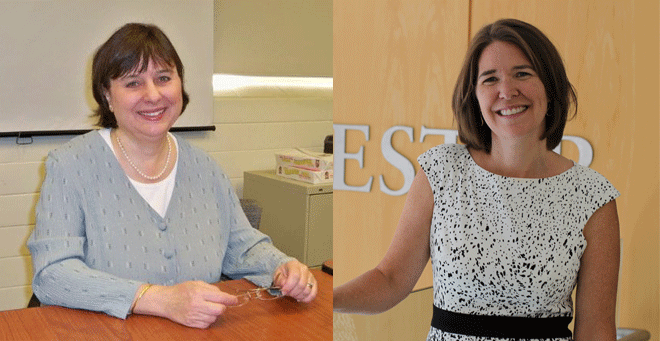 |
|
|
Marsha Ellison, PhD, (left) and Kathleen Biebel, PhD |
The transition from teenage years to adulthood is challenging for many young people, but it is far more difficult for people with psychiatric disabilities. Unemployment, dependence on public assistance, substance abuse and involvement in the criminal justice system are among the grim consequences that often befall young people with severe mental health conditions if they graduate from high school without the training and skills necessary to progress from high school to college or other vocational training and employment.
Investigators at UMass Medical School are addressing the problem with “Translating Evidence to Support Transitions (TEST): Improving Outcomes of Youth in Transition with Psychiatric Disabilities by Use and Adoption of Best Practice Transition Planning,” a five-year, $750,000 grant from the National Institute on Disability, Independent Living, and Rehabilitation Research (NIDILRR).
“States are increasingly recognizing that their populations of students with mental health conditions are burgeoning, in desperate need, and have the most implications for state expenditures later on in life in terms of poverty, permanent disability, crime, homelessness and health disparities,” said Marsha Ellison, PhD, associate professor of psychiatry and principal investigator for the project. “So states have a growing awareness of the importance of interventions for this population.”
With TEST, Dr. Ellison and co-principal investigator Kathleen Biebel, PhD, are developing, testing and refining a curriculum that will help special education departments in high schools provide intensive, focused support to help students with mental health issues transition successfully to post-secondary education and work. UMMS is one of three recipients of the first-of-its-kind funding opportunity to translate knowledge into action.
“This project is taking research evidence developed with our colleagues here at the Transitions Research and Training Center and actually translating it into practice,” said Dr. Biebel, associate professor of psychiatry and co-director of the Systems and Psychosocial Advances Research Center (SPARC) at UMMS; the Transitions RTC is an initiative of SPARC that houses a rehabilitation research center funded by NIDILLIR. “These research-informed practices will be developed and tested initially in one school district in South Carolina. We will then identify a state and provide intensive technical assistance to all high schools across that state, all the while refining the tools and evaluating reach and impact.”
With input from collaborators across the country, Ellison and Biebel will develop materials, procedures and guides for implementing three research-informed best practices in high school transition planning: written goals for a concentration of career and technical coursework during high school; student-led transition planning efforts; and representation of adult-serving disability agencies and colleges on transition teams. Previous NIDILRR-funded research by SPARC has demonstrated the power of these three practices for later employment and school enrollment.
“The TEST grant is important because when we can demonstrate its impact, evidence-based transition planning can be implemented in many other settings beyond special education,” said Maryann Davis, PhD, associate professor of psychiatry and interim director of SPARC and director of the Transitions RTC. Dr. Davis was a member of the study committee that produced the 2014 Institute of Medicine report “Investing in the Health and Well-Being of Young Adults.” The report was a call to arms for improved behavioral health care for individuals age 18 to 26, a critical developmental period with long-lasting implications for a person’s economic security, health and well-being.
“TEST is a good example of the expanding research in the transition age youth arena, where UMass Medical School, SPARC and the Transitions RTC are really setting the national agenda,” Biebel concluded.
Related links on UMassMedNow:
SPARC new name for mental health services research unit
Center guides youth with serious mental health issues into adulthood